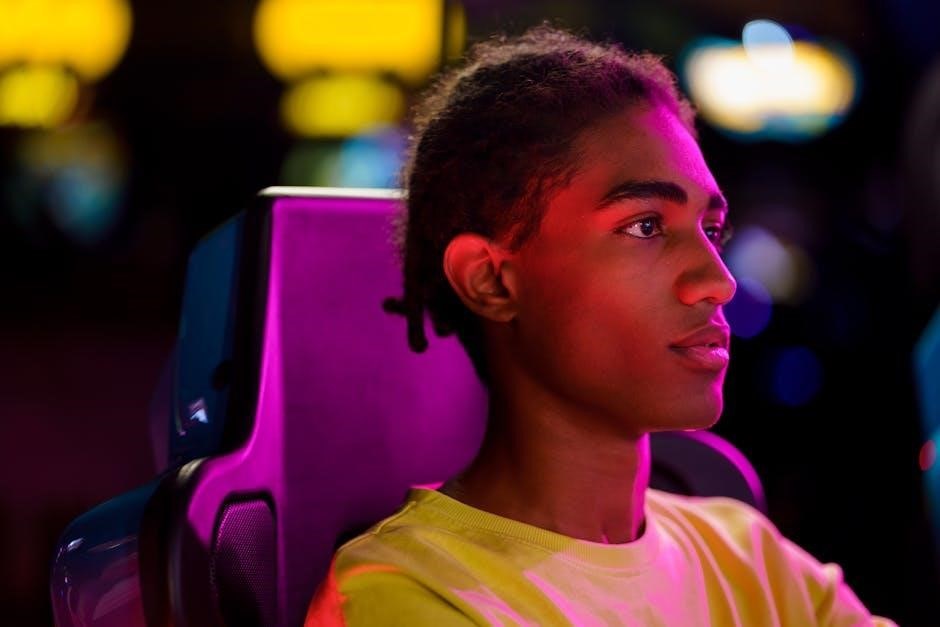21 Lessons for the 21st Century by Yuval Noah Harari is a visionary investigation into today’s most urgent challenges‚ offering insights to navigate the future.
Overview of the Book’s Central Themes
21 Lessons for the 21st Century explores the most pressing challenges facing humanity today‚ offering a roadmap for navigating the complexities of modern life. Harari delves into themes such as technological disruption‚ the rise of artificial intelligence‚ and the implications of climate change‚ urging readers to rethink their assumptions about the future. The book also examines the information overload in the digital age‚ the erosion of trust in institutions‚ and the ethical dilemmas posed by rapid scientific advancements. By addressing these issues‚ Harari provides a framework for understanding the interconnected nature of global challenges and the need for global cooperation to address them. The book is a call to action‚ encouraging individuals to embrace critical thinking and adaptability in an era of unprecedented change.
Why the 21st Century Poses Unique Challenges
The 21st century presents unparalleled challenges due to the convergence of technological‚ environmental‚ and societal shifts. Unlike past eras‚ the pace of change is exponential‚ driven by artificial intelligence‚ automation‚ and biotechnology‚ which are reshaping industries and lifestyles. Climate change and ecological degradation threaten global stability‚ while the information overload and rise of fake news erode trust in institutions. Additionally‚ the growing wealth gap and political polarization further destabilize societies. These challenges are interconnected‚ making them difficult to address in isolation. The century’s unique complexity demands innovative solutions and global cooperation to ensure a sustainable and equitable future for all. The need for adaptability and critical thinking has never been more urgent.
Key Challenges of the 21st Century
The 21st century brings transformative challenges‚ including rapid technological advancements‚ climate change‚ and societal shifts. Key issues encompass artificial intelligence‚ ecological collapse‚ and information overload‚ demanding urgent solutions.
Technological Disruption and Its Impact on Society
Technological disruption is reshaping society at an unprecedented pace‚ with advancements in artificial intelligence‚ automation‚ and data processing. These innovations are transforming industries‚ from healthcare to education‚ but also raising ethical dilemmas. The rise of AI challenges traditional employment structures‚ potentially displacing jobs while creating new ones. Society must adapt to these changes swiftly to avoid widening inequality. Additionally‚ the ubiquity of technology in daily life has altered how people interact‚ with social media influencing politics‚ culture‚ and mental health. As technology evolves‚ it is crucial to establish frameworks that balance innovation with ethical considerations‚ ensuring that progress benefits humanity as a whole rather than exacerbating existing divides.
The Rise of Artificial Intelligence and Automation
The rise of artificial intelligence (AI) and automation is revolutionizing industries‚ promising unprecedented efficiency but also posing significant societal challenges. AI systems‚ capable of learning and adapting‚ are increasingly deployed in sectors like healthcare‚ finance‚ and transportation. While these technologies enhance productivity‚ they threaten traditional employment models‚ potentially displacing millions of workers. Ethical concerns arise regarding data privacy‚ algorithmic bias‚ and decision-making transparency. As AI assumes roles once exclusive to humans‚ society must address questions of accountability and the future of work. Balancing innovation with safeguards is essential to ensure AI serves humanity’s best interests.
Moreover‚ the integration of automation reshapes job markets‚ necessitating new skill sets and education systems. The ethical implications of AI demand proactive policies to mitigate risks and ensure equitable benefits.
Climate Change and Ecological Collapse
Climate change and ecological collapse are among the most pressing challenges of the 21st century‚ threatening global stability and human well-being. Rising global temperatures‚ melting ice caps‚ and extreme weather events underscore the urgency of the crisis. Biodiversity loss and ecosystem collapse exacerbate these issues‚ risking food security and planetary health. The book emphasizes the interconnectedness of environmental and social systems‚ highlighting how climate change disproportionately affects vulnerable populations. To address this‚ global cooperation‚ sustainable practices‚ and radical policy shifts are essential. The crisis demands immediate action to reduce carbon emissions and adapt to irreversible changes. Without collective effort‚ the consequences of ecological collapse will be catastrophic‚ reshaping life as we know it.
The ethical imperative to act is clear‚ as future generations depend on today’s decisions to preserve a habitable Earth.
Lessons for Navigating the Modern World
21 Lessons for the 21st Century offers key insights for thriving in a rapidly changing world. It emphasizes understanding information overload‚ building resilience‚ and making ethical decisions in uncertain times.
Understanding the Information Overload
21 Lessons for the 21st Century highlights the challenge of navigating a world flooded with information. Harari emphasizes that clarity is power in a deluge of irrelevant data. To manage this‚ individuals must learn to identify key search terms‚ refine their queries‚ and use tools like filters and modifiers to narrow results. Critical thinking is essential to evaluate sources and avoid misinformation. The book underscores the importance of focus and discernment in decision-making‚ urging readers to prioritize meaningful information over noise. By mastering these strategies‚ individuals can better navigate the complexities of the modern world and make informed choices amidst the chaos. This skill is vital for thriving in an era where information overload threatens to overwhelm and distract.
Building Resilience in the Face of Uncertainty
21 Lessons for the 21st Century emphasizes the importance of building resilience to navigate the uncertainties of modern life. Harari argues that individuals must cultivate adaptability and mental flexibility to thrive in a rapidly changing world. This involves embracing lifelong learning‚ staying open to new ideas‚ and fostering emotional stability. Resilience also requires a clear sense of purpose and values‚ enabling individuals to remain anchored amid chaos. By focusing on what truly matters‚ people can better cope with unexpected challenges and maintain hope for the future. Harari underscores that resilience is not about avoiding change but about learning to adapt and grow through it‚ ensuring a stronger foundation for facing the unknown.
Ethical Considerations in a Rapidly Changing World
21 Lessons for the 21st Century delves into the ethical dilemmas arising from technological advancements and societal shifts. Harari highlights the need for a global ethical framework to address issues like AI‚ climate change‚ and data privacy. As traditional institutions struggle to keep up‚ individuals must take responsibility for ethical decision-making. The book urges a balanced approach‚ combining scientific progress with moral accountability. By fostering empathy and global cooperation‚ society can navigate ethical challenges without compromising human values. Harari emphasizes that ethical choices must be proactive‚ anticipating future consequences to ensure a compassionate and equitable world.

The Role of Education in the 21st Century
Education must adapt to prepare students for a rapidly evolving world‚ emphasizing critical thinking‚ creativity‚ and lifelong learning to address future challenges and uncertainties effectively.
Adapting Educational Systems to New Realities
As the 21st century unfolds‚ educational systems must evolve to address emerging challenges and technological advancements. Traditional models are being reevaluated to prioritize critical thinking‚ creativity‚ and adaptability. The rise of automation and AI demands a focus on skills that machines cannot easily replicate‚ such as emotional intelligence and problem-solving. Lifelong learning is becoming essential‚ as individuals will need to continually update their skills to remain relevant in a rapidly changing job market. Additionally‚ there is a growing emphasis on global perspectives and interdisciplinary approaches to equip students with a holistic understanding of complex issues. By integrating these changes‚ education can better prepare future generations to thrive in an uncertain and dynamic world.
Emphasizing Critical Thinking and Lifelong Learning
Critical thinking and lifelong learning are cornerstone skills for navigating the complexities of the 21st century. As information overload becomes a norm‚ the ability to discern quality from quantity is vital. 21 Lessons for the 21st Century highlights the importance of fostering analytical minds capable of evaluating evidence and challenging assumptions. Lifelong learning ensures adaptability in a world where technological and societal changes occur at an unprecedented pace. By embracing these principles‚ individuals can stay informed‚ adaptable‚ and resilient‚ enabling them to thrive amidst uncertainty and drive meaningful progress in both personal and societal contexts.

Global Cooperation and Conflict
21 Lessons for the 21st Century explores the delicate balance between global cooperation and conflict‚ emphasizing the need for international collaboration to address climate change‚ economic inequality‚ and political tensions.
The Importance of International Collaboration
International collaboration is vital for addressing global challenges like climate change‚ pandemics‚ and economic crises. The book emphasizes that no nation can solve these issues alone‚ as they transcend borders.
Navigating Geopolitical Tensions and Wars
Navigating geopolitical tensions and wars requires a deep understanding of global power dynamics and the root causes of conflicts. The 21st century has seen rising nationalism‚ territorial disputes‚ and ideological clashes‚ which threaten global stability. Technological advancements‚ such as cyber warfare and artificial intelligence‚ have introduced new dimensions to modern conflict. Harari highlights the need for diplomacy and international cooperation to prevent escalation. However‚ the rise of authoritarian regimes and declining trust in global institutions complicate efforts to maintain peace. The book underscores the importance of addressing economic inequalities and cultural misunderstandings to reduce tensions. By fostering dialogue and shared goals‚ humanity can mitigate the risks of devastating wars and build a more cooperative world order.

Economic Shifts and Inequality
Economic shifts and inequality are driven by technological disruption and globalization‚ widening the wealth gap between the rich and poor‚ threatening social stability and requiring systemic solutions.
The Growing Wealth Gap and Its Implications
The growing wealth gap is a critical issue in the 21st century‚ driven by technological disruption and globalization. Wealth concentration among the elite has accelerated‚ while millions face economic insecurity. This disparity threatens social cohesion and political stability‚ as those left behind grow disillusioned with systems perceived as unfair. Automation and AI further exacerbate inequality‚ displacing jobs and rewarding capital over labor. Yuval Noah Harari highlights how this divide could deepen without intentional interventions‚ such as progressive taxation‚ education reform‚ and universal basic assets. The implications are far-reaching‚ risking societal fragmentation and undermining democratic institutions. Addressing inequality requires global cooperation and a reimagined economic framework to ensure equitable growth and shared prosperity.
Redefining Work in the Age of Automation
Redefining work in the age of automation is a central challenge‚ as AI and machines increasingly replace traditional jobs. This shift disrupts economies‚ leaving many without stable income sources. Harari warns that automation could exacerbate inequality‚ as those who own the machines reap most benefits while workers struggle. The rise of the “useless class” looms‚ where humans are no longer economically essential. To adapt‚ societies must rethink work’s purpose and explore solutions like universal basic income or lifelong learning programs. The focus shifts from traditional employment to fostering creativity‚ emotional intelligence‚ and skills that machines cannot replicate. Redefining work requires a cultural and economic transformation to ensure dignity and purpose for all in an automated world.

Cultural and Social Transformations
Cultural and social transformations are reshaping norms‚ values‚ and identities. Harari explores how globalization and technology drive these changes‚ fostering diversity but also sparking tensions and divisions. Society must adapt to evolving definitions of identity‚ inclusivity‚ and human connection in a rapidly changing world. These shifts challenge traditional structures‚ urging a reevaluation of cultural narratives and social cohesion. The balance between progress and preservation remains a critical issue.
Changing Norms and Values in Society
In 21 Lessons for the 21st Century‚ Yuval Noah Harari examines how technological‚ cultural‚ and social shifts are reshaping societal norms and values. The rise of globalization and digital connectivity has led to a blending of cultures‚ challenging traditional identities and beliefs. Harari highlights the tension between progressive ideologies and nostalgic yearnings for past certainties. Issues like privacy‚ freedom‚ and equality are redefined in the digital age‚ creating ethical dilemmas. The book explores how these changes impact individual and collective identities‚ urging society to adapt to evolving norms while addressing the risks of polarization and cultural erosion. Harari emphasizes the need for a global ethic to navigate these transformations and foster unity amidst diversity. This section underscores the importance of understanding and embracing change to sustain social cohesion.
Diversity‚ Identity‚ and Inclusion in the Modern World
Yuval Noah Harari’s 21 Lessons for the 21st Century delves into the complexities of diversity‚ identity‚ and inclusion in a rapidly changing world. As globalization and technological advancements blur cultural boundaries‚ societies face challenges in balancing diversity with unity. Harari explores how identity politics and nationalism are reshaping modern discourse‚ often leading to polarization. He emphasizes the need to reconcile individual identities with global interdependence‚ urging societies to foster inclusion without erasing unique cultural heritages. The rise of digital platforms‚ while connecting diverse voices‚ also risks amplifying echo chambers and exclusionary behaviors. Harari advocates for a nuanced understanding of diversity‚ advocating for systems that celebrate differences while promoting shared human values to ensure a cohesive and inclusive future for all. This balance is crucial for navigating the complexities of the 21st century.
The Future of Humanity
21 Lessons for the 21st Century explores humanity’s potential evolution‚ addressing technological advancements and ethical dilemmas while envisioning a future where human values adapt to global challenges.
Exploring Possibilities for Human Evolution
21 Lessons for the 21st Century delves into the potential transformation of humanity through technology and ethics. Harari discusses how advancements in artificial intelligence‚ biotechnology‚ and data science may redefine human capabilities‚ raising questions about identity and purpose. The book explores the possibility of merging humans with machines‚ creating new forms of life‚ and the ethical dilemmas this entails. It also examines the risks of inequality‚ as access to enhancing technologies could widen gaps between the rich and the poor. Harari emphasizes the need for global dialogue to navigate these changes‚ ensuring that human evolution remains aligned with core values of compassion‚ equality‚ and freedom. The future of humanity‚ he argues‚ depends on balancing innovation with moral responsibility.
Mitigating Risks of Global Catastrophes
21 Lessons for the 21st Century emphasizes the urgency of addressing global catastrophes‚ such as climate change‚ ecological collapse‚ and nuclear war. Harari highlights the interconnectedness of these threats‚ which transcend national borders and require collective action. He advocates for global cooperation to combat climate change‚ stressing the need for drastic reductions in carbon emissions and investments in renewable energy. Additionally‚ the book explores the risks of technological escalation‚ such as AI misuse and cyber warfare‚ urging ethical frameworks to guide innovation. Harari also addresses the potential for pandemics and bioterrorism‚ calling for strengthened international health systems. By fostering global solidarity and prioritizing long-term thinking‚ humanity can mitigate these risks and ensure a sustainable future. The book serves as a call to action‚ urging leaders and individuals to act decisively in the face of escalating global challenges.